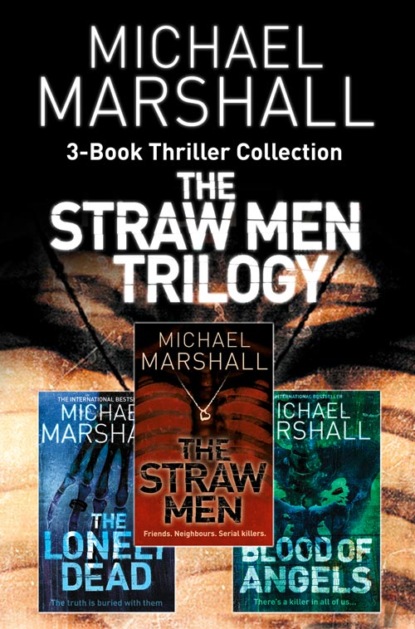По всем вопросам обращайтесь на: info@litportal.ru
(©) 2003-2024.
✖
The Straw Men 3-Book Thriller Collection: The Straw Men, The Lonely Dead, Blood of Angels
Настройки чтения
Размер шрифта
Высота строк
Поля
Mildly: ‘Ward, don’t be an asshole.’
‘You’re the asshole,’ I snarled. ‘You assumed I’d be no good and you’d be able to come out here and beat me even though you can’t play at all.’
He stood for a moment, hands in the pockets of his chinos, and looked at me. It was a strange look, cool and appraising, but not empty of love. Then he smiled.
‘Whatever,’ he said. And he left, and I guess he walked home.
I turned back to the table, grabbed my beer and drank the rest of it in one swallow. Then I tried to smack one of his remaining balls down the end pocket and missed by a mile. At that moment I really, really hated him.
I stormed over to the bar to find Ed already had a beer waiting for me. I reached for money, but he shook his head. He’d never done that before. I sat down on a stool, didn’t say anything for a few minutes.
Gradually we started talking about other things: Ed’s views on local politics and feminism – he was somewhat critical of both – and a hide he was thinking of lashing together out in the woods. I didn’t see Ed ever having a huge impact on the first two subjects, or getting it together to build the hide, but I listened anyway. By the time Dave wandered in I could more or less pretend that it was just business as usual.
It was an okay night. We talked, we drank, we lied. We played pool not very well. At the end I walked out to the car, and stopped when I saw a note had been pushed under one of the wipers. It was in my father’s handwriting, but much smaller than usual.
‘If you can’t read this the first time,’ it said, ‘get a ride. I’ll drive you out here tomorrow to pick up the car.’
I screwed the note up and hurled it away, but I drove home carefully. When I got back Mom was in bed. There was a light in Dad’s study but the door was shut, so I just went upstairs.
I got up once, in the late morning, and made a cup of instant coffee. Apart from that I sat until mid-afternoon, until the sun moved across the sky and started to come directly through the window and into my eyes. This broke the spell I’d been in, and I got out of the chair knowing I’d never sit there again. It wasn’t comfortable, for a start. The cushion was threadbare and lumpy, and after a couple of straight hours on it, my ass hurt. I walked back to the kitchen, rinsed my cup out, left it upside down on the side to dry. Then I changed my mind, wiped it, and put it back in the cupboard. I folded the cloth and looped it over the handle on the oven.
I stood irresolute in the hallway, wondering what to do next. Part of me believed that the filial thing to do would be to check out of the hotel and come stay here for the night. The rest of me didn’t want to. Really did not want to. I wanted bright lights and a burger, a beer, someone who’d talk to me about something other than death.
Suddenly irritable and sad, I stalked back into the sitting room to retrieve my phone from the coffee table. My lower back ached, probably from sitting in that lousy chair.
The chair. Maybe it was because the light was different; the sun had moved around the yard since the morning, creating new shadows. More likely, a few hours of tears had simply cleared my head a little. Either way, now that I was looking at it, the seat cushion looked a little odd. Slowly slipping the Nokia into my pocket, I frowned at the chair. The cushion, which was an integral part of it, definitely bulged up in the centre. I reached out experimentally, prodded it. It felt a little hard.
Maybe he’d had it reupholstered, or refilled with something. Rocks, perhaps. I straightened up, ready to forget it and leave the house. My hangover was beginning to bloom. Then something else caught my attention.
There’s a proper way of placing objects in relation to each other, especially if those objects are large. Some people don’t see this. They’ll just throw the furniture down any old how, or all against the walls, or at right angles, or so everyone can see the TV. My father always made sure stuff was placed just so, and then got riled if anybody moved it. And my father’s chair wasn’t in the right place. It wasn’t off by much, and I don’t think anybody else would have noticed it. It was too square on to the other furniture, and seemed to stand too much out on its own. It just didn’t look right.
I squatted down in front of it, examined the line where the cushion was attached to the body of the seat. A strip of braid covered the join. It was worn and frayed. I grabbed one end of it and pulled. It came away easily, revealing an opening that looked like it once had been stitched.
I slipped my hand inside. My fingers navigated through some kind of dry, squishy stuff, probably cutup chunks of foam. In the middle they found a solid object. I pulled it out.
It was a book. A paperback novel, a new-looking copy of a blockbuster thriller, the kind of thing my mother might pick up on a whim at the checkout, and skim through in an afternoon. It didn’t look read. The spine was unbent, and my mother was no stickler for keeping books in pristine condition. It didn’t make any sense. It couldn’t have gotten in the chair by accident.
I flicked through the pages. In the middle of the book there was a small piece of paper. I pulled it out. It was a note, just one line, written in my father’s handwriting.
‘Ward,’ it said: ‘We’re not dead.’
Chapter 3 (#ulink_7a86f55b-73e0-5e4c-b418-f8b993896464)
A stream in southern Vermont, the water clear and cold, hurrying over a bed of pale boulders between the steep banks of a valley up in the Green Mountains. The sky seems to start a few bare feet above the trees, a sheet of spun sugar frozen grey in fading light. The leaves on the ground, broken bulbs of stained-glass colours, are covered with a patchy dusting of snow. On either side of the stream, connected by a pair of old stone bridges fifty yards apart, lies the small village of Pimonta. There are perhaps twenty houses all told, though nearly a dozen of these appear solely for summer use or abandoned altogether. Next to one squats the hulk of a very old Buick, its oxidized shell now the colour of a thundercloud. A few vehicles sit in other driveways, rugged types suggesting their owners are the owners of several children and at least one dog. It is very quiet, apart from the noise of the stream, which has been flowing for so long that its clamour is more of a colour than a sound. Smoke slips sluggishly out of a few chimneys, including those of the Pimonta Inn, a refined bed-and-breakfast that backs onto the river and which is almost full in this last week of the foliage season.
A man stands on one of the bridges, leaning against the wall and looking down at the tumbling water. His name is John Zandt. He is a little under six feet tall and wearing a thick coat against the cold. The coat accentuates his shape, which is compact and broad-shouldered. He looks like a man who could carry a pair of suitcases a long way or hit someone extremely hard. Both are true. His hair is short and dark, his features harsh but well-arranged. There is a two-day growth of stubble on his chin and cheeks. He has stayed for the last week at the Pimonta Inn, living in a suite consisting of a bedroom, a bathroom and a small sitting room with a wood fire, all of which is expensively comfortable in an unkempt country style. He has spent the days walking in the mountains and valleys in the area, avoiding the marked trails, with their straggles of brightly clad hikers fretting about bears. Sometimes he has found the vestiges of old homesteads, now little more than piles of dark wood strewn amongst the undergrowth. There are no echoes to be heard, no matter how long you stand and listen, and places that were once by a path have become uncharted again. The roads found different routes, turning some spots into destinations and leaving others as wilderness, perhaps for ever.
Zandt likes to sit in these places a while, considering how it might have been. Then he starts walking again, walking until he is tired and it is time to return to the inn. In the evenings he has sat in its cosy sitting area, politely avoiding conversation with other guests and the establishment’s proprietors. The books in the small library speak of ossification and contentment. Perhaps forty people have nodded at him in the last couple of weeks, without learning his name or being able to describe him in any detail.
After the evening meal, which has generally been excellent if slow in coming, he has returned to his suite, built a fire, and stayed up as long as he can bear it. He has been dreaming a great deal recently. Sometimes the dreams are of Los Angeles, of a life that is gone for good and therefore cannot be escaped. In the past he has tried both alcohol and heroin, but found neither of much help even in great excess. These days he simply wakes and lies on his back, waiting for morning, thinking of emptiness. He has never tried to kill himself. It is not in his nature. If it was, he would already be dead.
Now, as he leans on the wall of the bridge in the fading light, he is considering what to do next. He has money, some of it the remnants of a summer of hard manual work. He thinks that it is perhaps time for him to get back in the saddle, and head to a city. Maybe somewhere down South, though he has found that he likes the cold and the dark forests. His motivation is hampered by the fact that he has no special need for more cash, or any desire to do anything with that he already has. Also that after a life spent amongst buildings, they have suddenly stopped having any meaning to him. Empty roads and unbounded spaces seem to have more resonance than whatever lies on either side.
He looks up when he hears the sound of a car approaching from along the road from the north. After a while its headlights, used earlier in the afternoon than is the local custom, peer up over the hill. Soon the car follows them down into the village, past the small general store and videotape library. It is a Lexus, very black and new. It stops smoothly outside the inn.
The car makes a ticking sound as the engine cools. Nobody gets out for a few moments. Zandt watches it until he is sure that the shapes inside are looking at him. His own car, something cheap and foreign he bought off a bleak lot in Nebraska, is sitting in front of the outbuilding that holds his room and several others. The keys to the car are in his pocket, but he cannot get to it without taking himself closer to the Lexus. He could turn, walk across the bridge and between the houses on the other side, head up into the hills, but he does not have a mind to. He should, he knows, have paid cash for his lodging. That is his usual practice. But when he arrived he had none, and it was late. Withdrawing some from an ATM in the nearest town would have left just as clear a sign. The time to avoid this confrontation, whatever it may hold, is two weeks past. He merely looks down again at the water below, and waits.
Over at the car, the passenger door opens and a woman climbs out. She has medium-length dark hair, wears a dark green suit, and is of average height. Her face is striking, meaning that you will either find her plain or beautiful. Most people put their money on the former, which is fine by her. Her silence on the journey has already irritated Agent Fielding, who first met her three hours previously – and who, had he not been tasked with driving her down to Pimonta, could have been home several hours by now. Fielding still has no idea why he has been dragged all this way, which is just as well, because it could only barely be classified as official business. He is simply doing what he is told, a much-underrated skill.
The woman closes the door with a soft clunk that she knows the man at the bridge can hear. He doesn’t move, or even look up, until she has walked down past the inn, past the boarded-up premises of a defunct local potter, and onto the bridge.
She walks to within a few yards of him and then stops, feeling slightly absurd and rather cold.
‘Hello, Nina,’ he says, still without looking.
‘Very cool,’ she replies. ‘I’m impressed.’
He turns. ‘Nice suit. Very Dana Scully.’
‘These days we all want to look that way. Even some of the guys.’
‘Who’s in the car?’
‘Local agent. From Burlington. Nice man gave me a lift.’
‘How did you find me?’
‘Credit card.’
‘Right,’ he says. ‘Long way to come.’
‘You’re worth it.’
He looks sceptically at a woman he had once thought striking, and now finds plain once more.
‘So what do you want? It’s cold. I’m getting hungry. I’d be surprised if we have anything to say to each other.’
For just a moment she looks beautiful again, and hurt. Then, as if none of this meant anything to her, or ever had, ‘It’s happened again,’ she says. ‘Thought you’d want to know.’
She turns on her heel and walks back up toward the car. The engine is running before she opens the door, and within two minutes the valley is empty and quiet again, leaving just a man on a bridge, his mouth slightly open, his face pale.
He caught up with her twenty miles south, driving hard down narrow mountain roads and slinging the car around every bend. Southern Vermont isn’t designed for speed, and the car twice started to plane on ice patches. Zandt noticed neither this nor the handful of local drivers who had just time to register his approach before he was behind them, gaining speed, leaving their cars rocking in his wake. At Wilmington he hit a junction. The Lexus wasn’t visible in either direction. He reasoned that she’d be heading for the nearest place where she could get airlifted back to civilization, and took the left turn up Route 9 for Keene, just over the state line in New Hampshire.
He made better time on the wider road, and soon began to see the Lexus’s distinctive tail lights in the distance ahead, flickering through trees on a kink in the road, or blinking off the other side of a dip. He eventually caught it on a straight patch just south of Hardsboro, where the road passed by a cold, flat lake that looked like a mirror reflecting a sky full of shadows.
He flashed his headlights. There was no response. He pulled closer, flashed again. This time the Lexus picked up a little speed. Zandt accelerated, pressing hard, and saw Nina turn and clock his face through the back window. She spoke to the driver, who didn’t slow.
Zandt floored the pedal and pulled out from behind, roared forward until he was just ahead, then angled in and braked the car hard. He was out of the door before the engine had died, and so was Fielding, hand already coming back out of his jacket.







